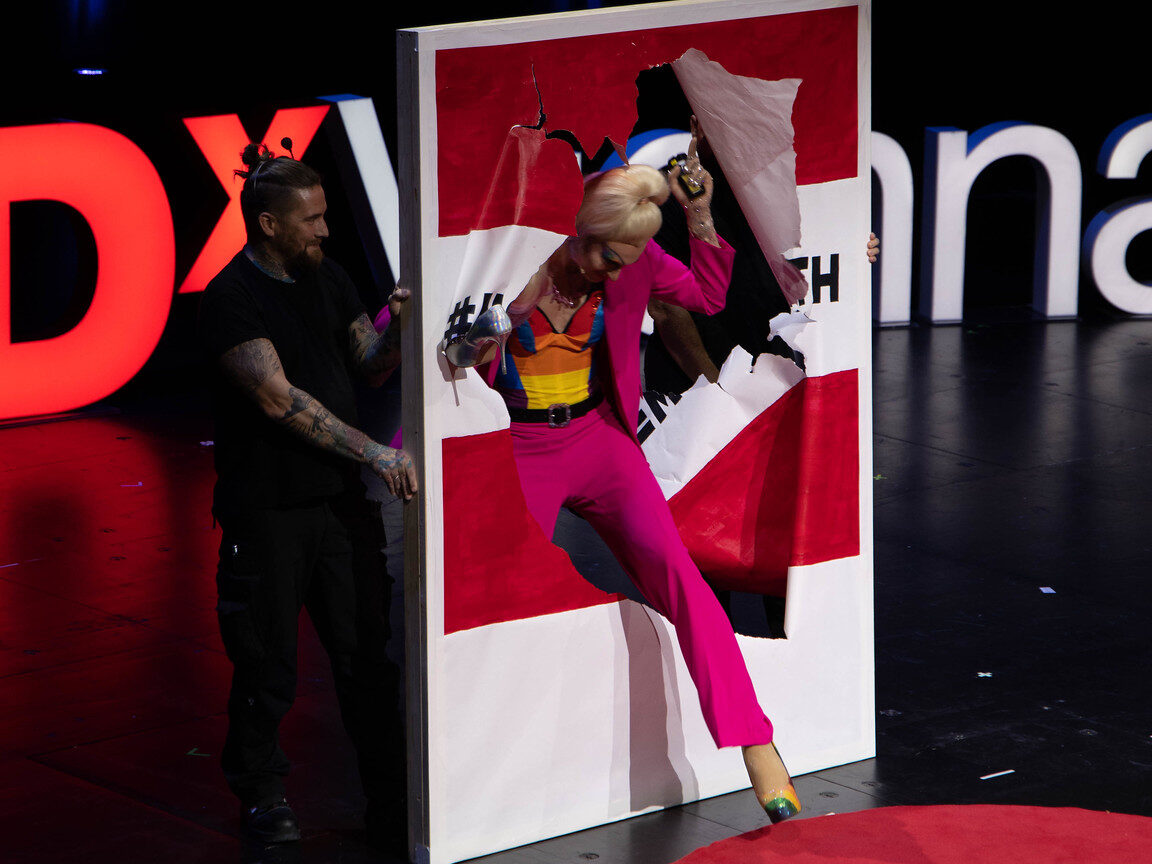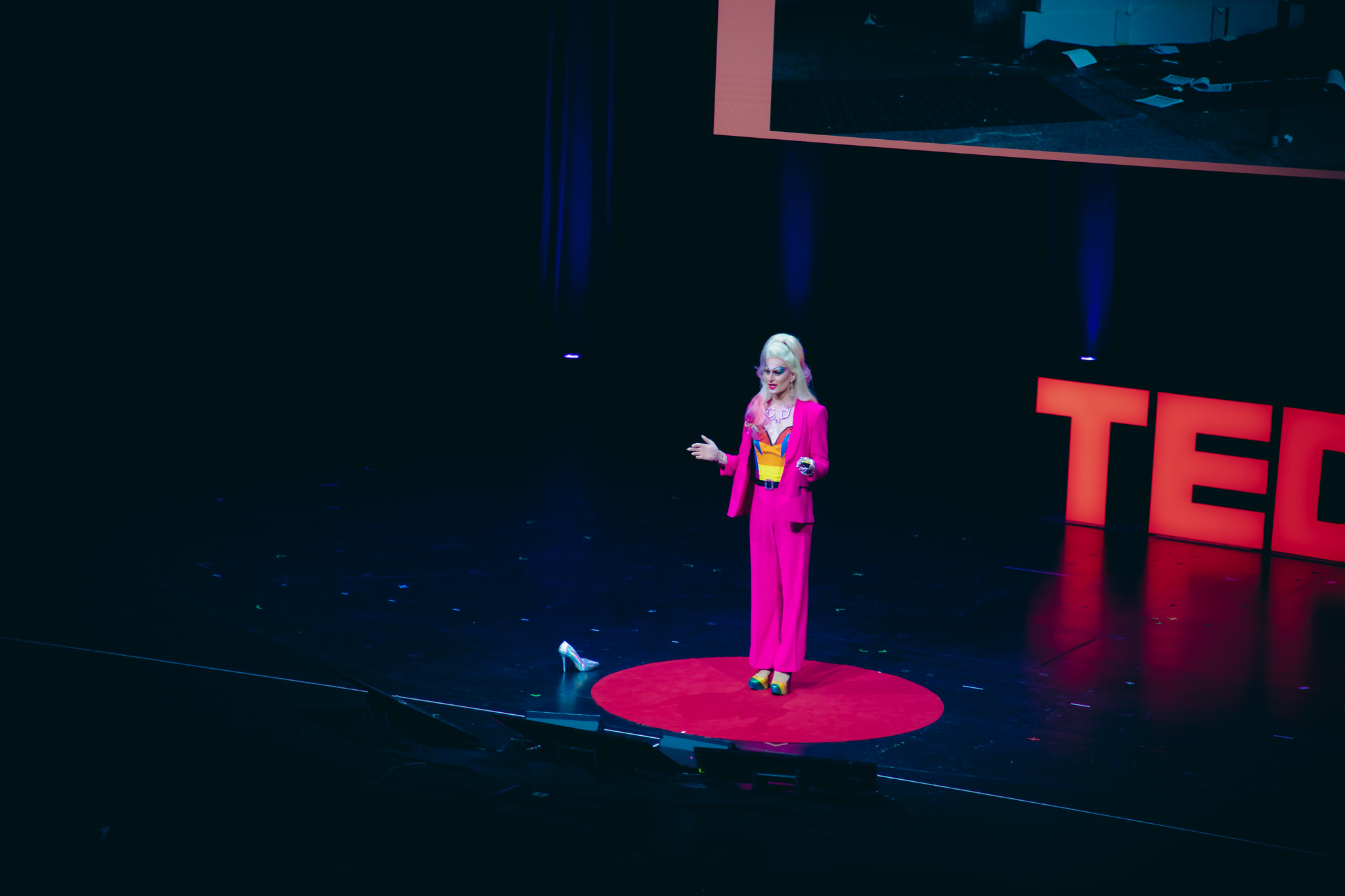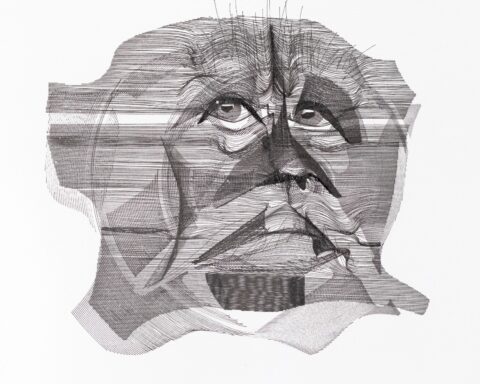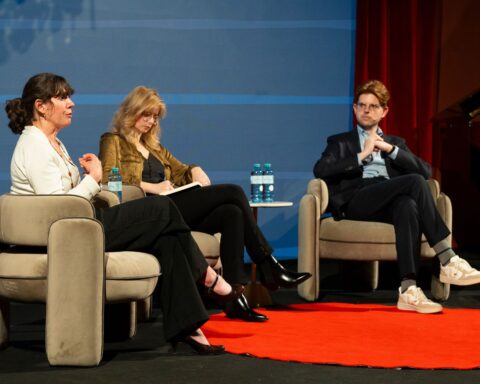Candy Licious is a Viennese activist, drag artist, and model, who is an integral part of the LGBTQ+ community in Vienna. At our last event, On The Rise, Candy spoke on the TEDxVienna stage about love, diversity, overcoming hate, and how we must come together as a community to build bridges, not walls.
After the event, I had the chance to speak with Candy Licious about their inspiring talk and about how we as a community can do more.
First, how did it feel to be on the stage at TEDxVienna?
It was amazing, the feeling was incredible. When I was asked to speak at TEDx, I thought it was a joke. I thought it couldn’t be true. It was really great, the team was so welcoming and supportive. The experience was so powerful. You can really share your expertise with people who really are interested. For me, it was kind of like being on the finale of RuPaul’s drag race. Tearing down the wall was a release for me. I could release my anger from what happened to me back in June. I could make a path for something new, to build a bridge for myself. And to help others break walls.
When did you start performing in drag?
My drag history is a long journey. It started around seven years ago. When I began, it was more travesty. Travesty artists perform as singers, and only do it on stage. For them, it’s nothing too political. I started in a group eight years ago, for about one year. Growing up I also had experience dancing and I never had a fear of the stage. When I moved to Vienna, I got in contact with drag queens for the first time. What they did and their presence was so amazing to me. I started wearing, for example, very androgynous clothing, maybe skinny jeans, a small heel, and lip gloss. During my time in the travesty group, I met my drag mother, the person who taught me everything, and after one year, I said I wanted to grow, so I dropped out of the group and created my own thing. It was a long process.
When did you make the step from being a drag performer to a drag activist?
Actually, I was an activist before I was a drag performer. I started activism in Vienna, where I got to know about many organizations. First, I wanted to be in a group with people who had similar interests as me. I began volunteering at the AIDS Hilfhaus ten years ago. It continued. I was with Queeramnesty, which I still am, I joined Rechtskomitee Lambda, and I joined other organizations. Some I am still involved with, some not. I became known as a drag artist, and I thought I could combine the two things. During my first years of drag, I did these things on a volunteer basis. For example, I dressed in drag and went to clubs to hand out condoms. At first, I didn’t care about being famous or being on stage, but being an activist made it easy for me to also be in drag, and it led to this point, where I am a performer and activist and I can combine or divide it depending on what the people want. It definitely gives me a bigger stage for my activism. It’s really great that it can be possible to be an activist and a drag queen.
People look at drag queens differently. That’s the thing. It’s something big and colorful and bright. And now I combine it with educating children, something I’ve just started. I just want to give children the possibility to see that it’s okay to be a princess when you grow up.
You mentioned, in your talk, that you have a degree in sex education. Could you tell us a bit more about what this degree entails?
This degree gives me the opportunity to give workshops at schools, for example. I did workshops for AIDS Hilfehaus on diversity, young bodies, STIs, on sexuality in general. I did that for children between twelve and eighteen years old, for the most part. Then I saw that in the US there is a ‘drag queen story time’. And I thought, okay, I wouldn’t want to talk about sex education with young children (even though there are sex educators who go to primary schools and talk about body changes). But for me, I can go in and provide a bit of fun through storytelling and if they ask me something, I can provide education.
With this degree, I do workshops for AIDS Hilfehaus, but also for the Institute for Sexual Pedagogy (where I completed my degree) and I am now a lecturer for the upcoming sex educators about queer life and about discrimination. After I finished my degree, I was already a trainer there.
Wow! Congratulations! A question about your experience during Vienna Pride Week and your “Drag Queen Story Time”. I can’t fathom what you must have felt after the wall that was built in front of the library, not only as a person but as an educator. As a teacher, how did you feel after having people try to tell you that you can’t do what you are educated to do?
I think it was the same feeling that I had in general. I think that people didn’t really care that I was an educator. Being a drag queen, they had a word to put in front of it. They also said that if you talk about gender or diversity in front of children, you will sexualize them. Sometimes they didn’t even refer to me as a drag queen.
It showed me, especially as an educator, that there is a lot to do when it comes to the educational system, and there are a lot of people who don’t want their children to learn these things, although they are necessary. In my view, you can’t start soon enough. With young children, you can’t talk about sex, but you can talk about feelings. But people have to be open to that, and there are still people who don’t want that for their children because they don’t know better. When I was in school, I didn’t get a great education when it came to those topics (for example, HIV). The first time I came into contact with it was when I moved to a big city.

Also, in your talk, you mentioned that sharing on social media isn’t enough to make someone an activist. What is something that I, our readers or audience members can do to help the LGBTQ+ community here in Vienna or around the world? What steps should we take?
When we look at it globally, we can learn about existing organizations. For example, someone in Vienna can start by sharing on social media or even go to an event that needs volunteers (for example the Rainbow Ball or Pride). Sometimes these organizations just need hands. They also need money. When we compare Vienna to Berlin, the funding for our organizations is low. An ally could collect money for their birthday and make a donation to a Viennese organization. Booking an organization that does workshops is a different way that you can help, by enabling them to spread their experience.
Is there anything else you would like to share with our readers?
One thing I wanted to say is that people shouldn’t be afraid to ask questions, especially of me. I’ve learned how to deal with many questions. For example, “What is a drag queen?”, “What is non-binary?”. I know there are a lot of question marks out there for people who aren’t involved in this. I urge the people who think that they lack knowledge, to ask.
In regard to politicians, people should be more careful with what they say. It’s a common tendency, for people to speak over us rather than with us. I want to emphasize that this is a kind of discrimination. For example, three straight men speaking about gay rights doesn’t add up. If they want to make a decision, they should ask us what we need. This is something that happens with many laws, especially to women, like when you look at the US with the abortion law. This is something that happens around the world, even in Austria.
Watch Candy Licious’ full talk at TEDxVienna On The Rise:
Photos by Cherie Hansson, Gabriel Bangura, and Nikita Russ.





